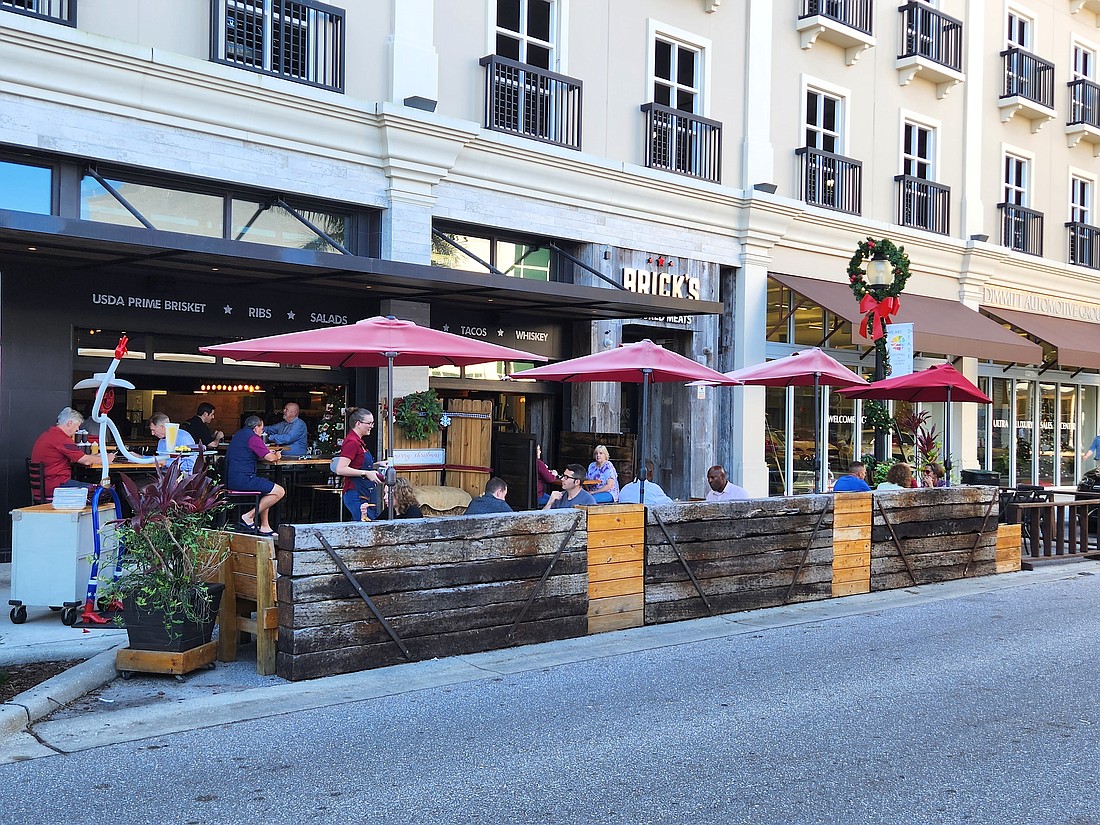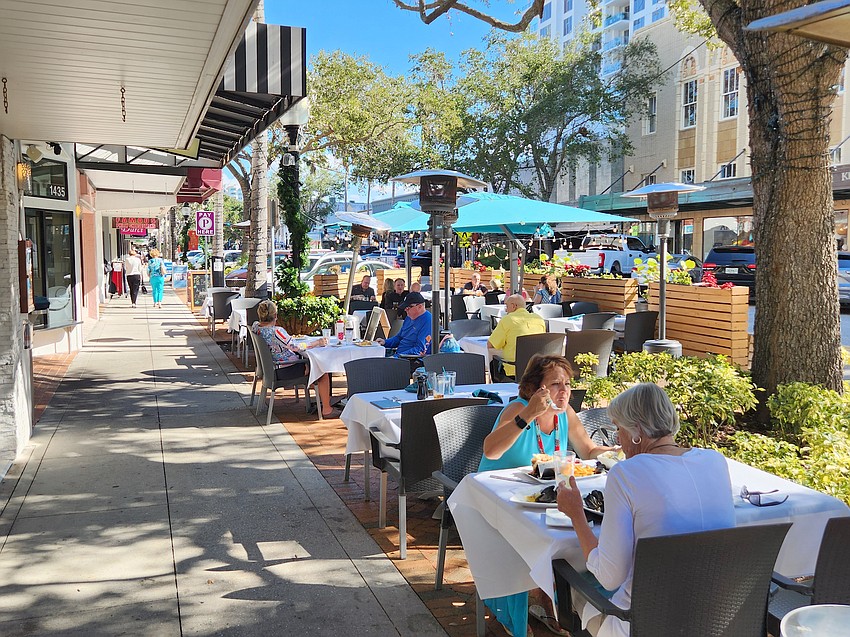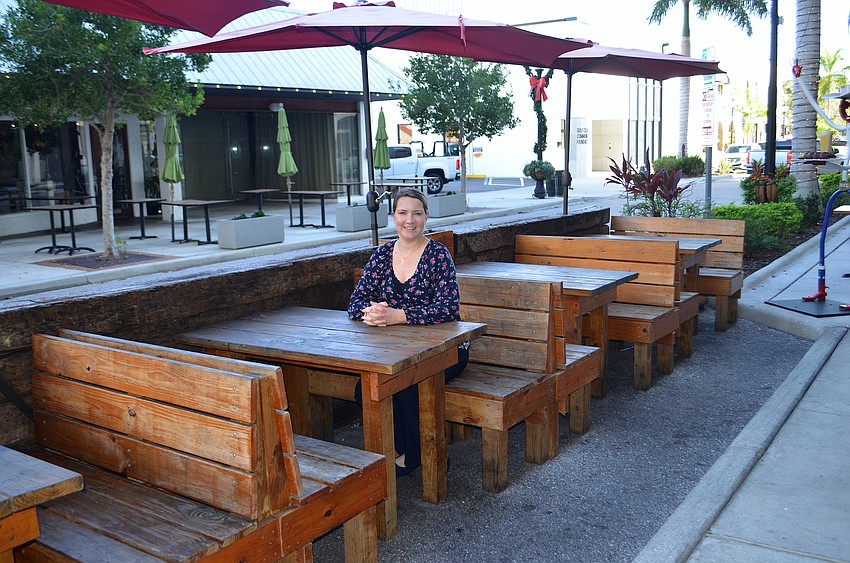- May 10, 2025
-
-
Loading

Loading

Dining al fresco in public parking spaces in downtown Sarasota won’t end as scheduled on Dec. 31, but unless the city implements a new program, it won’t extend beyond a newly rescheduled termination date of March 31, 2023.
And according to City Attorney Robert Fournier, the city will also have to identify a new justification for continuing the pandemic-era temporary measure of “parklet” dining, which allows restaurants to serve customers outdoors in cordoned areas covering street parking spaces.
Representatives of two downtown restaurants — Bricks Smoked Meats and Duval's — spoke to the Sarasota City Commission during its past two meetings about their need to continue the practice permanently, citing a holdover of some customers being reticent to venture indoors, the growing popularity of outdoor dining in downtown and the jobs supported by the revenue it generates.
In November 2021, city commissioners approved an extension of parklet dining through the end of this year. Unlike sidewalk dining permits, parklet space came free of charge. The parklet dining extension will come at a price to restaurants, City Manager Marlon Brown telling commissioners the city will charge $25 per day per parking space occupied through the end of the March.
In the interim, Brown has directed the city attorney’s office to research how other municipalities have implemented permanent parklet programs on city streets. Parklet dining was temporarily and broadly permitted under executive order of Gov. Ron DeSantis at the height of the pandemic.
Jonathan Van Dyke, general manager of Duval’s at 1435 Main St., said participating restaurants have appreciated the city providing free space during the pandemic and knows parklet dining going forward will come at a price. Duval’s occupies one angled parking space where it can serve 24 customers.

“We knew that was temporary,” Van Dyke said of the city’s largesse. “What we also recognize is that the demand for outdoor dining significantly increased. And we recognize that in order to be able to meet the needs of our city and meet the needs of the guests and residents, we would need to pay for that space.”
An investment in maintaining the additional seating parklets provide is important to the bottom line, especially for the family-owned restaurants that dominate the downtown culinary scene. While all may appear normal post-pandemic, Meghan Croke, general manager of Bricks Smoked Meats at 1528 State St., said it is anything but.
“The restaurant industry was hit pretty hard during the pandemic, and that continues in a different form,” said Croke, whose restaurant seats 28 in two parallel parking spaces. “It’s very difficult to staff. Our labor costs are up over 20%, and supply chain issues continue to cause shortages and higher costs. So while the pandemic may have eased in terms of numbers of cases, the after-effects definitely linger, and the parklets have been a huge help.”
Of the 19 original parklets permitted by the city, 15 are still allowed and 14 remain active. All but three are on Main Street, one of them on State Street and two at St. Armands Circle. They range in the number of parking spots occupied, but are typically one or two spaces.
Charging no fee for the spaces has cost the city parking revenue, hence the plan to charge per space used if and until a more permanent program is adopted. The city has many examples around the state to consider when crafting its own plan.
Parklets didn’t rise up out of COVID-19. San Francisco is generally credited with creating the first parklets in 2010 and the trend has swept across the country in the decade since. Some cities incorporate them as economic development or urban renewal tools. Tampa and Jersey City, New Jersey, now dub parklets as “streateries.” Tampa has waived fees and permits associated with sidewalk dining and removed parking meters to allow restaurants to build in areas along the specific streets.
St. Pete Beach has a pricey plan. For $50,000, one restaurant has been allowed to build a parklet structure on a city street, taking over four parking spaces and paying $1,500 a month — or 10% of revenue from the outdoor seating — to rent the space for three years.
In 2015, the city of Miami Beach founded a pilot program for businesses on Washington Avenue, near the all-pedestrian Lincoln Road, to install parklets. In July 2021, Miami Beach published a 14-page guide for parklet design and implementation, specifying construction standards, color schemes, table types, menu boards and more.

In Polk County, the Lakeland Downtown Development Authority is installing parklets in front of two of downtown’s busiest restaurants on Kentucky Avenue. That will allow them to expand what the policy cites as “outside dining, a staple of the Florida dining experience which has become even more popular during the pandemic.”
Such is the point made by both Croke and Van Dyke regarding customer demand. Van Dyke said reservations for their outdoor tables typically fill up first.
Bricks and Duval’s are among the handful of downtown restaurants that installed sturdy, permanent-looking extensions of their restaurants into the street. Others have opted to stick with the metal barricades provided by the city, or something in between.
“People are more conscious of their whereabouts and behavior. That means many prefer to dine outdoors and the ability to provide that has been a huge help,” Croke said. “If the city wants to be more stringent on the installations, it just creates a better downtown atmosphere for all of us. Even if people aren't dining, it just brings an energy and sense of welcoming, and it seems to enhance the reputation for walkability and hospitality. I don't really see many downsides from our perspective.”
While some customers still prefer the perceived safety of dining al fresco, others simply prefer to be outdoors when weather permits. The parklets provide that option in the downtown environment for restaurants lacking the outdoor space available to those in suburban locations, including downtown’s foremost competitor for disposable spending, University Town Center.
“Being in historic downtown, we have a natural beauty to the area, but we don't have the ability to have patios with the exception of new construction,” Van Dyke said. “Especially in the downtown core within the downtown improvement district, there's not really the ability to rebuild buildings, some of them which have historic significance, and the ability to extend outdoors to have that outdoor dining.”
Parklets may go beyond helping level the outdoor dining playing field with suburban competitors. Croke said extending the seating into the street where possible gives downtown restaurants a distinct advantage.
“There's just something so special about downtown Sarasota. It’s the European flair,” she said. “We already have a lot of Europeans here and with the coffee shops and outdoor seating and the beautiful plants everywhere, it’s just such a cool city. Parklets just added to it and I don't think anyone wants them to go away.”